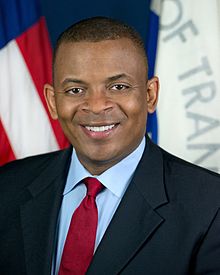US Secretary of Transportation Anthony Foxx will deserve a special place in the history of US transportation policy. It has been a long time since the nation’s transport policy leader has reframed the conversation so profoundly. An interview of him in Citylab by Laura Bliss, dubbing him “The Great Connector,” draws out several of these themes:
 Building Communities, Enabling Contact
Building Communities, Enabling Contact
We might not always acknowledge it, but the reality is, when we build infrastructure we’re also building communities. It’s different than housing. It’s where boundaries are drawn, where highways and rail lines cut through, where transit stops are or the places that are skipped over. All of those decisions matter, because they all affect how we come into contact with each other.
This is a truism in urbanist circles but I’ve never heard it so forcefully from a Secretary of Transportation. In a department where handing out infrastructure money is the primary source of power, Foxx reframed the whole task away from the usual cost/benefit conversations or the love of technologies, to focus instead on the fundamental purpose of transport: how we “come into contact with each other” and thus, among other things, build communities. The acknowledgment of the “dividing” effect of some infrastructure is especially historic. Freeways enabled some connections only by obstructing others, like your ability to walk to a grocery store on the other side or the ability of a bus route to trace a straight path.
Devolving Power to States and Cities
Shifting power downward from the Federal government to states and cities used to be a conservative “small government” idea, but no longer. The first step is to impose fewer Federal limits on how money is to be spent.
I’ve the made case—and will continue to make the case in my next life—that we need a more flexible funding approach. Rather than say that a certain percentage has to go to roads or transit or what have you, let the communities decide how that money should be spent, and grade them on criteria that shows how they’ve improved the system.
He’s especially clear that people who know the local issues need to make the decisions about them:
Regions and cities and towns could use more direct federal funds as well. This harkens back to my mayor days. Those areas can get things done relatively quickly, and many times they have a different sense of what they need than a state might. Rather than having regions, towns, and cities arguing over money, there should be a more dedicated program.
This is especially important for cities, whose needs are different from those of other areas but who often lack the autonomy to solve their own problems. We are entering an era where urbanist impatience with a controlling and dictating Federal government will be as great as that of conservatives has always been, and for similar reasons. If the next Administration is as hostile to urban issues (or perhaps, hostile to urban interests other than elite real estate development) we may soon reach a point where devolution of power is the only thing the nation can agree on. Cities will have to take care of themselves, and have the power to do so. Even some urban real estate tycoons may see the value of that.
Transit, and the City, as Unifier
Finally, in an age of division, he captures the singular role of transit in holding together urban civilization, using one of my favorite images:
Transportation can bring us together. When I ride on the New York City subway system, I’m riding with millionaires and with homeless people. No one is hidden from the other. That interaction doesn’t mean people live in the same neighborhoods, or that they go to the same school. But what it does mean is that no one is invisible.
Everything about politics today is about visibility. Are you forced to see the consequences of your own ideas? It is the genius of the city that almost everyone must, because they happen in front of you on the street, not just on television or the internet. My own city, Portland, is in a time of general prosperity, but it just had a mayoral election where the predominant issues were homelessness and affordability. That happened because those issues aren’t invisible in a city, the way they can be in suburbs or country towns. The genius of the city is that the billionaire, whatever his achievements, must still acknowledge that he shares a city with homeless people, whose condition may result from the same forces that created his. Transit keeps that reality present through the act of transportation. That’s not its purpose; no social engineering is involved. But the fact remains that in cities we must use space efficiently, and that often requires traveling in each other’s presence, so that we see the totality of what our city is.
Foxx’s reign has also included significant achievements in planning for automation, and he hints that they may still do something about the intrusiveness and harrowing potential of drones. Good stuff. But these shifts in tone may matter as much as anything. Good job, Secretary, and I hope you continue to influence the transport conversation.
“The first step is to impose fewer Federal limits on how money is to be spent.”
Why isn’t the first step to reduce federal funding and let states and municipalities fund their own projects?
“If the next Administration is as hostile to urban issues (or perhaps, hostile to urban interests other than elite real estate development) we may soon reach a point where devolution of power is the only thing the nation can agree on.”
The question is whether the fair-weather states-rights supporters will continue to agree with devolution when, inevitably, power shifts again.